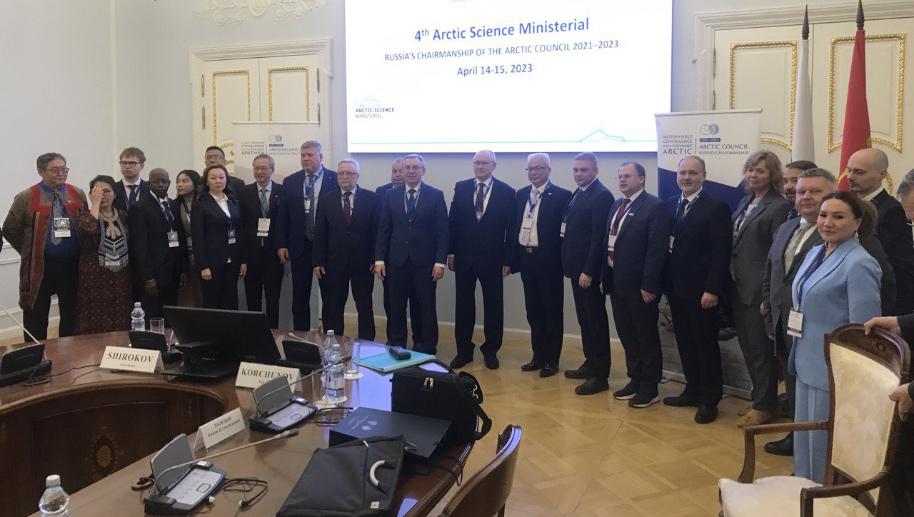
4th Ministerial Meeting on the Development of Science in the Arctic Addresses International Scientific Cooperation in Northern Latitudes

Participants in the 4th Ministerial Meeting on the Development of Science in the Arctic (ASM4), which took place in St. Petersburg on 14–15 April, discussed the problem of finding solutions for the sustainable economic development of the Far North, as well as international cooperation and integration in science. The meeting was held as part of the plan of events of Russia’s chairmanship of the Arctic Council in 2021–2023, which are managed by the Roscongress Foundation.
“Monitoring climate change and its impact on Arctic ecosystems, as well as studying the degradation of permafrost and the problem of carbon balance are priority tasks that require international scientific cooperation. It is crucial to establish an effective system to monitor and assess contamination with radioactive chemicals and petroleum products. The sustainable development of the Arctic region requires comprehensive scientific measures, the coordinated actions of research teams, and the effective use of scientific infrastructure. The goals we have set to ensure the sustainable development of the Arctic are real and achievable. We will only achieve the best results through joint coordinated actions,” Russian Minister of Science and Higher Education Valery Falkov said in his welcoming address to the meeting participants.
During the first day of the meeting, the participants recapped Russia’s chairmanship of the ASM4 and presented consolidated data about ongoing Arctic research. A collection on the main focuses and results of Arctic research was presented, including such topics as improving the living conditions of the Arctic population, the environment, adaptation to climate change in high latitudes, biodiversity conservation, the economic development of the Far North, the development of tourism, approaches to funding research by countries and organizations, major research initiatives, and the infrastructure used in research. This information has been entered into a database that can be accessed by government agencies, international organizations, the Indigenous peoples of the Arctic, as well as scientific and public organizations.
“Russia traditionally pays special attention to the development of the Arctic and intensifying international cooperation in the region. This is why Russia has identified the need for the sustainable development of the region with a balanced combination of environmental, social, and economic dimensions as the main focus of its work as chair of the Arctic Council. During the Russian chairmanship, the foundation of domestic Arctic research has been further strengthened, and the geographical range of scientific ties has expanded. Russia will continue to prioritize strengthening scientific ties with other countries that are interested in mutually beneficial cooperation in the Arctic region,” said Nikolay Korchunov, ambassador-at-large of the Russian Ministry of Foreign Affairs and chair of the Arctic Senior Officials.
The meeting included a ceremony to transfer the ASM chairmanship from Russia to Norway. For the first time, Russia proposed using a sculpture made from walrus tusks and a team of sled dogs as a symbol of the chairmanship, which symbolizes the achievement of goals through joint efforts.
The programme of the second day of the ASM4 included reports and presentations by representatives of non-Arctic states, the Russian Association of Indigenous Peoples of the North, as well as scientific and educational organizations. The experts discussed approaches to the training of scientific personnel from among the representatives of the Indigenous peoples of the North. The ASM4 events were attended by representatives of foreign embassies and foreign organizations, including Belarus, China, Singapore, Kenya, and Cameroon, as well as Russian national and regional agencies that are responsible for coordinating research activities in the Arctic zone, organizations of the Indigenous peoples of the Arctic, and specialists and experts from among the federal and regional authorities.
The events of the Ministerial Meeting on the Development of Science in the Arctic will be held in the historical Smolny Institute and on board the Krasin icebreaker. The Russian Ministry of Education and Science is coordinating the events during the ASM as part of Russia’s chairmanship of the Arctic Council, while the co-organizer is the Russian State Hydrometeorological University (St. Petersburg).
Russia is chairing the Arctic Council in 2021–2023. A cross-cutting priority of the chairmanship is to ensure responsible governance over the sustainable development of the Arctic. The comprehensive programme of Russia’s chairmanship of the Arctic Council aims to promote cooperation to improve the well-being and quality of life of the Arctic population, including the Indigenous peoples of the North, adapt the Arctic to the effects of climate change, conserve the biodiversity and unique ecosystems of the Arctic, ensure socioeconomic development, find solutions in matters concerning global energy and transport security, promote scientific cooperation in high latitudes, and strengthen international cooperation.